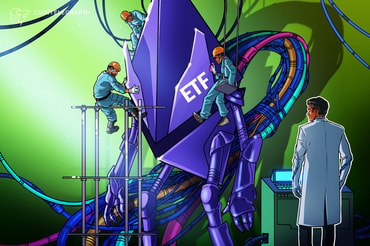Caroline Ellison Most Likely Won’t Serve Time, Polymarket Traders Bet

Election 2024 coverage presented by
This week in prediction markets:
A little more than a week after FTX CEO Sam Bankman-Fried was formally charged in December 2022, Caroline Ellison, his former lover, and CEO of Alameda Research, filed a plea deal asking for leniency in exchange for full cooperation with prosecutors.
Fast forward to earlier this month, and counsel for Ellison was before a U.S. court in Manhattan, arguing that she should get supervised release at most owing to her “extraordinary cooperation with the government.” Her sentencing hearing is scheduled for Tuesday afternoon in New York.
Traders on Polymarket are betting the court will show mercy, with “yes” shares for “no prison time” trading at 48 cents, meaning the market sees a 48% chance she’ll be released. Each share pays out $1 (in USDC, a cryptocurrency that trades 1:1 for dollars) if the prediction comes true, and nothing if it doesn’t.
But there’s also a slight possibility (20%) that Ellison gets 12 to 13 months.
Polymarket bettors have a mixed track record on guessing prison sentences.
While they correctly guessed that former Binance CEO Changpeng Zhao would spend less than six months in prison (he was sentenced to four, much less than what the Department of Justice wanted), they were way off on Bankman-Fried’s sentence, which came in at 25 years while the market was giving a 27% chance to 20-30 years, and a 28% chance to 40-50 years.
The semiconductor industry was rocked this weekend, when news broke that Qualcomm had approached Intel about a possible takeover deal with analysts on the ground in Asia confirming that talks are taking place.
Polymarket bettors are only giving this a 13% chance of happening by Oct. 31.
From a purely financial perspective, Intel’s shareholders would certainly welcome such a deal.
The beaten-down stock is worth the same as it was 20 years ago because Intel missed the artificial intelligence gold rush as its efforts to create a competitive AI chip by 2017 failed, its efforts to compete against the likes of TSMC and Samsung in the foundry (chip facotr) business are foundering, and it lacks a GPU product that’s competitive with Nvidia for the ultra-high-margin data center industry.
Plus, Qualcomm’s Snapdragon chips, which are based on ARM designs, are now in laptops and impressing reviewers with their performance while Intel’s rivals are falling behind.
Regulators, on the other hand, are going to have a field day with this.
If there’s one thing that Taiwan and China agree on, it’s that Qualcomm acts as a monopoly in the mobile phone space, with regulators on both sides of the strait fining the company. Last week, the company lost an appeal in Europe to have a 2019 fine tossed which accused Qualcomm of predatory pricing.
Taiwanese trade publication Digitimes writes that Qualcomm’s acquisition of Intel would face antitrust, and financing hurdles, and the company may be biting off more than it can chew – which is why Polymarket bettors are skeptical that the deal will go through.
Two of the biggest names in crypto want to enter the prediction market space.
During last week’s Token2049 event in Singapore, decentralized exchange (DEX) dYdX said it plans to launch perpetual futures on prediction markets, which dYdX Foundation CEO Charles d’Haussy explained in an interview with CoinDesk would offer decentralized finance (DeFi) “a unique opportunity to regain attention.”
DYdX’s upcoming entry into prediction markets is expected later this year as part of its major dYdX Unlimited upgrade. Expect more specifics, like the categories of markets, as the launch date gets closer.
Also at Token2049, Wintermute announced it’s launching OutcomeMarket, a prediction market where outcomes are tradable as tokens listed on exchanges. Naturally, the first market launching is for the U.S. election, where users can punt TRUMP or HARRIS tokens.
The first exchanges to launch these tokens will be Bebop, WOO, and Backpack, but the exact date for the first day of trading isn’t yet known.
UPDATE (Sept. 23, 2024, 14:41 UTC): Adds date of Caroline Ellison’s sentencing hearing, fixes typo.
Edited by Marc Hochstein.
Disclosure
Please note that our privacy policy, terms of use, cookies, and do not sell my personal information has been updated.CoinDesk is an award-winning media outlet that covers the cryptocurrency industry. Its journalists abide by a strict set of editorial policies. In November 2023, CoinDesk was acquired by the Bullish group, owner of Bullish, a regulated, digital assets exchange. The Bullish group is majority-owned by Block.one; both companies have interests in a variety of blockchain and digital asset businesses and significant holdings of digital assets, including bitcoin. CoinDesk operates as an independent subsidiary with an editorial committee to protect journalistic independence. CoinDesk employees, including journalists, may receive options in the Bullish group as part of their compensation.

Published on Other News Site












